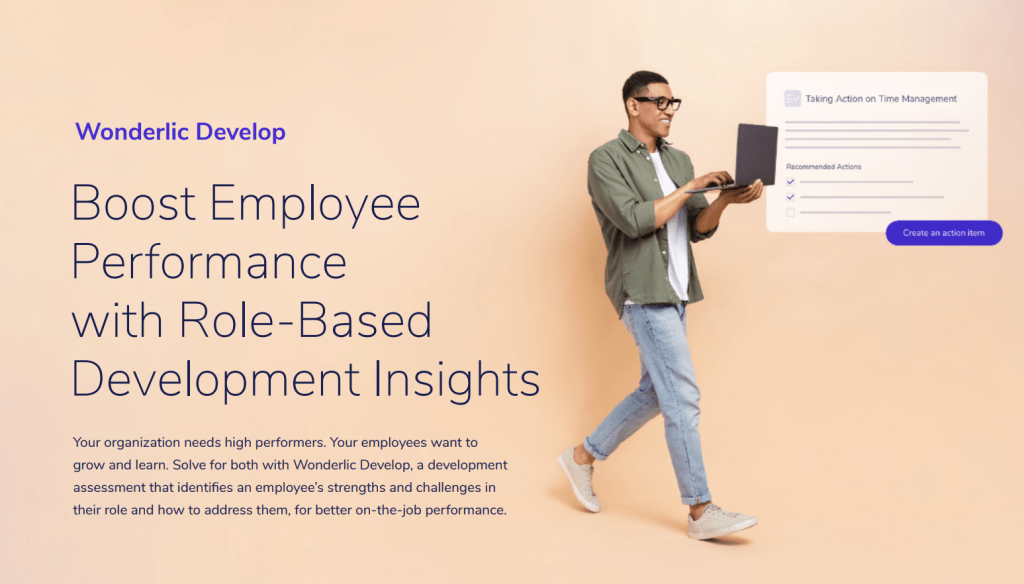Finding the ideal candidate amidst a flood of job applications is a challenging task, especially in today’s uncertain work environment where disruption, transformation, and competition are at all-time highs. By using pre-hire assessments, employers can make informed decisions and select the best candidate for the job.
Traditional hiring processes involving resumes and interviews simply fall short, shown to be about as effective as a coin flip. The abundance — or for senior roles, the extreme shortage — of choices can lead to many difficult and uncertain hiring decisions, and relying solely on intuition is unlikely to yield effective results for your business.
Consider these two examples: a candidate with stellar coding skills, proficient in executing tasks but lacking the motivation to adapt to emerging programming languages crucial for the job, or a salesperson with strong communications skills but lacking the motivation to push for a deal. While some candidates may look great on paper, how do you ensure potential hires possess the abilities, personality, and drive to meet the ever-evolving demands of their roles?
And remember, it’s not just about finding the best-fit candidate; it’s about identifying individuals poised for growth and success within the organization. Thankfully, advancements in industrial-organizational (I/O) psychology have helped create world-class pre-hire assessments. These candidate tests offer highly predictive insights into fit and long-term performance.
Table of contents
Helpful Downloads
What Is a Pre-Hire Assessment?
A pre-hire assessment is a recruiting tool that evaluates talent on multiple criteria to help recruiters and managers make the most informed talent decisions possible. The best pre-employment assessments use leading industrial-organizational (IO) psychology methodology to give recruiters an unbiased, comprehensive view of candidates — insights that far surpass those gleaned from resumes or interviews.
In the mid-1930s, E.F. Wonderlic pioneered the short-form cognitive ability test, helping companies assess candidate suitability for specific job roles. And with the advent of the internet in the 1990s, companies have since embraced digital testing options for wider accessibility. These assessments, rooted in decades of leading psychology and industrial-organizational science, have undergone a digital transformation to accommodate diverse methodologies and technologies.
Fast-forward to today, and cutting-edge pre-hire tests now use machine learning and AI to ensure precise alignment between assessment scores and specific roles. Pre-employment assessments may also incorporate up-and-coming technologies such as computerized adaptive testing, video-based simulations, and gamified assessments, all aimed at refining assessment accuracy. This concerted effort aims to provide smarter, more accurate, and faster pre-employment assessments tailored to give recruiters the most predictive insights possible.
Talent assessments come in various forms, measuring cognitive abilities, personality, skills, competencies, motivation, and overall fit — meaning how well the candidates will fit into your culture, team, and their role. It’s essential to understand the nuances among these assessment types and recognize their collective role in forming comprehensive employee evaluation criteria.
Types of Pre-Hire Assessments
Today, the pre-hire assessments that most accurately predict employee success are multi-measure tests that evaluate cognitive abilities, personality, and motivation. These fundamental categories, together, provide a comprehensive view that reveals if candidates can do the job, how they’ll do the job, and if they want the job. By integrating these assessments into your hiring practices, you can gain confidence that you’re recruiting top-tier candidates who are poised to grow with your company.
“When you can find something that gives you better hires and saves money at the same time in this economy, it’s a big win.”
Jeff McDonald, Director of HR at Sweetwater Sound
Not only do these three dimensions of multi-measure assessments aid in selecting ideal candidates, but they also play a pivotal role in cultivating and retaining a highly skilled workforce. Ultimately, they serve as the cornerstone in building a cohesive and effective team, fostering an environment where individuals can thrive and contribute to organizational success.
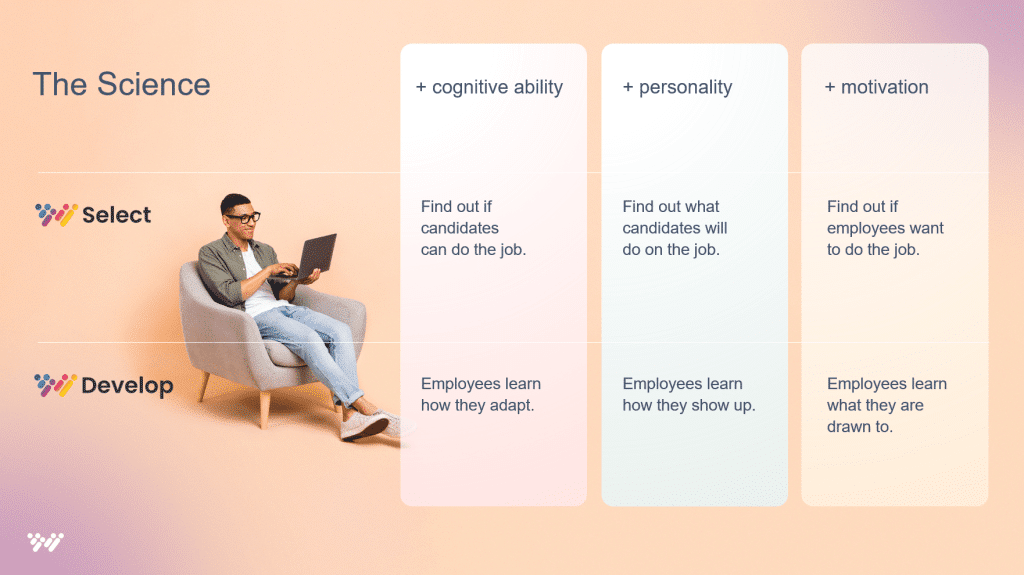
Why do certain assessments stand out among the rest?
The most predictive combination of assessments includes cognitive, motivation, and personality tests. Let’s dig into what makes them so special.
Cognitive Ability
Is highly predictive of job performance when combined with personality and motivation assessment. Cognitive assessments gauge a candidate’s ability to learn, adapt, solve problems, and process complex ideas. Typically, these tests feature challenges related to simple math, logic, language comprehension, memory, and spatial reasoning. They assist recruiters and hiring managers in selecting better candidates, predicting job success, and fostering a more agile workforce.
Personality
On the other hand, don’t have any right or wrong answers. However, the insights they provide about a candidate offer an understanding of qualities such as interpersonal preferences, general temperament, and behavioral tendencies. Moreover, pre-employment personality testing sheds light on a candidate’s preferred ways of collaborating with others, which can enhance employee management post-hiring.
The Five Factor Model, or Big Five Personality Test, stands as one of the most trusted pre-hire personality test frameworks. This model measures an individual’s Agreeableness, Conscientiousness, Extroversion, Openness to Experience, and Emotional Stability — the dimensions of personality deemed most comprehensive by I/O research.
Motivation
Remains an under-utilized area in pre-hire assessments. A relatively small percentage of pre-employment testing companies offer motivation assessments, with many exclusively focused on cognitive ability or personality assessments. Yet, when done correctly, these assessments are the top predictor of staying power, preventing voluntary turnover by understanding if a role inspires candidates and offers what they’re looking for.
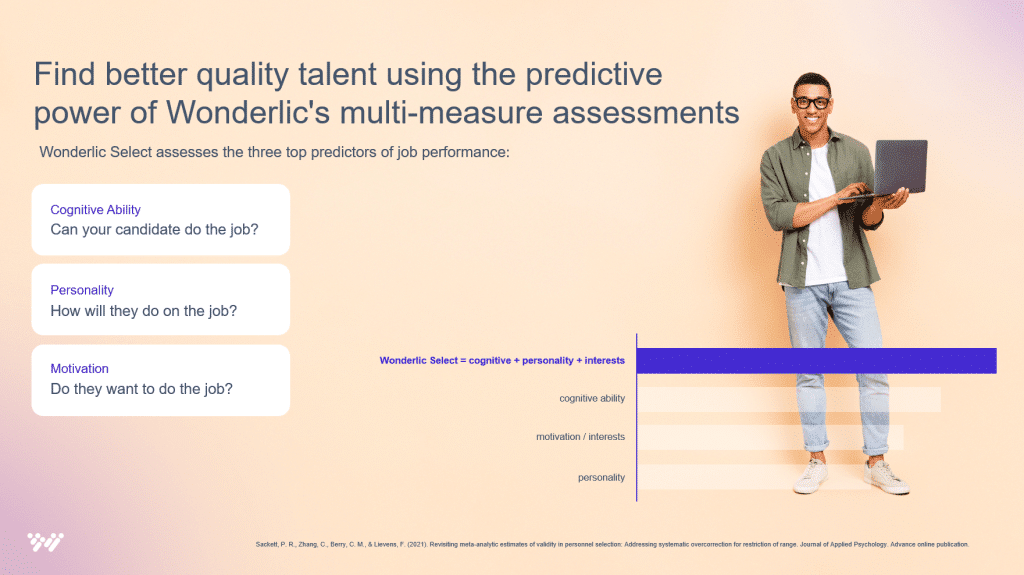
Combining data from a motivation test with cognitive ability and personality data has demonstrated highly predictive insights, surpassing even the combination of the latter two alone.
Other Assessments
Now, if you’re thinking we missed a few types of pre-hire assessments, you’re right. While there are additional types of pre-employment assessments on the market today, they aren’t as indicative of candidate and employee success for a number of reasons.
Emotional Intelligence Tests
For instance, pre-employment assessments measuring emotional intelligence might seem crucial due to the emphasis on self-awareness and empathy. However, personality and cognitive tests tend to cover this ground already. In essence, they fail to add value to the assessment equation.
Integrity Tests
Similarly, integrity tests focusing on traits like honesty and dependability don’t necessarily offer unique insights beyond what personality tests already cover. Moreover, they can harbor biases through poorly disguised questions probing for wrongdoing. When this happens, candidates can easily see through the intentions of these pre-hire assessments.
Skill Tests
Skills tests are a nuanced form of pre-employment assessment. While beneficial in evaluating task performance for specific job roles, they come with limitations. Although they effectively measure immediate capabilities — such as coding proficiency, writing skills, or financial reporting — they fall short in acknowledging the rapid depreciation of learned skills and the value of soft skills or power skills. Currently, the half-life of acquired skills is estimated at two to three years, meaning skills will be worth half as much in a few years. Thus, skills tests overlook an increasingly vital aspect — not just current skills but also the adaptability and learnability to acquire new skills in the future.
Game-Based Tests
Another emerging form of pre-hire assessments involves games-based tests. Despite providing an engaging test-taking experience, this approach lacks the science necessary to validate how well a candidate fits into a specific role. While it’s a good idea to monitor advancements in this field, making hiring decisions based solely on game-based tests is unlikely to be the most effective.
Multi-Measure Assessments
Multi-measure assessments challenge the idea that a singular test can encapsulate everything. Why settle for just one data point about an individual when you can explore multiple factors? One-dimensional talent assessments, be it personality-based, cognitive-focused, or otherwise, can fall short of offering hiring managers a comprehensive, three-dimensional understanding of a candidate’s fit and potential.
In truth, what HR truly requires is a combination of pre-employment assessments, creating a well-rounded view of a candidate’s capability to excel in their position for a sustained period. Thankfully, multi-measure talent assessments evaluate role-critical critical attributes like adaptability, problem-solving skills, and abstract thinking — all qualities known to strongly signal ongoing success.
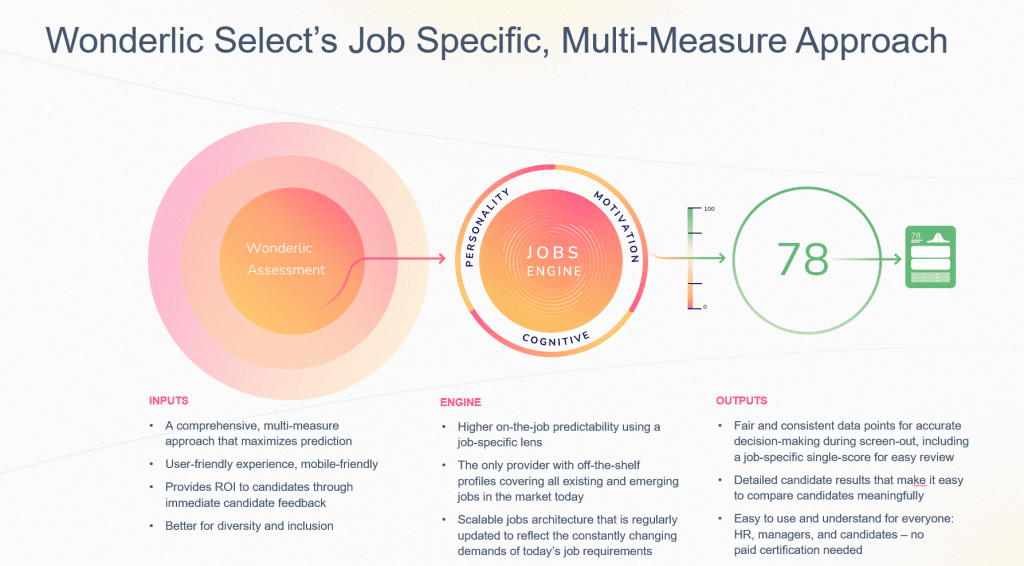
The Benefits of Pre-Hire Assessments
Pre-hire assessments empower recruiters and hiring managers to rely on data-driven hiring decisions, boosting their confidence in the selection process. Tailoring assessments to specific job requirements yields measurable impacts, resulting in several benefits:
- Cost savings: Pre-hire assessments reduce hiring costs by efficiently identifying qualified candidates, minimizing expenses associated with prolonged hiring cycles and turnover.
- Increased job satisfaction: Multi-measure assessments identify motivation and long-term fit, offering detailed insights into employees who will both excel in their job and enjoy it.
- Improved retention: Hand in hand with job satisfaction, pre-employment assessments help identify candidates more likely to enjoy their roles, leading to reduced turnover rates and improved retention. Recruiters are also more likely to hire candidates with high degrees of overall fit, meaning they mesh well with their team, the company culture, and their role.
- Decreased bias: Using scientifically validated methodologies to score candidates allows for objective evaluation based on key performance metrics specific to a particular role, reducing human biases in hiring.
- Faster hiring: Pre-hire assessments speed up the candidate screening process by eliminating manual resume reviews and saving valuable time and resources for recruiters.
- Better Candidate experience: Pre-employment assessments help your potential employer learn more about you. Resumes give a decent overview of your work history, but that’s about it. Pre-hire assessments help employers pick up where your resume left off. By honestly answering questions based on your personality, motivation, and cognitive ability, you’re helping your potential employer understand why you’re truly right for the role.
The Outcomes of Using Pre-Hire Assessments
Pre-employment assessments are all about identifying high-quality talent — high-quality meaning candidates that can do the job and maintain peak performance for a sustained period. When a selected candidate is truly fit for a role, they are likely to have higher job satisfaction and thus stay in their role longer, reducing employee churn.
Faced with high turnover rates, Duracell identified a lack of motivation among new hires and inadequate learning abilities, prompting the company to seek a more effective upfront screening process to target qualified candidates and reduce costly turnover. Read more about how Duracell improved employee retention by 400%.
On the flip side, making hiring decisions based on intuition or gut feelings can lead to ill-fit hires that either don’t meet performance expectations or leave the company shortly after being hired. Either of these outcomes is costly. The average cost of a bad hire is $17,000 but could creep up to $240,000 when you consider recruiting fees, onboarding, and salary.
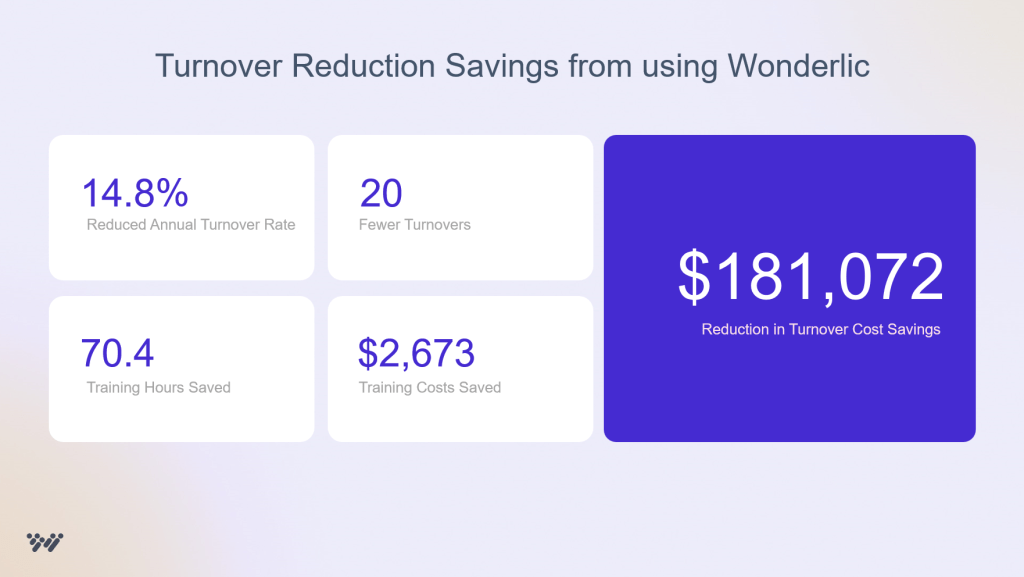
Best Practices for Choosing a Pre-Hire Assessment
To be effective, pre-hire assessments must meet five employee evaluation criteria: They must be accurate, reliable, resistant to self-representation, fair, and adaptable. Let’s explore these best practices in detail.
Prioritize Reliability
Reliability in pre-hire assessments measures how consistent the results are when the same person takes the test multiple times. If someone can get significantly different results on the same test, it’s unreliable. Sometimes, companies try to make their tests more appealing to HR or test-takers by simplifying or shortening the assessment, but fewer questions can make the test less reliable.
For example, tests that ask you to choose between two options might be quicker and easier for test-takers, but studies show they’re not as reliable as tests with more choices. Here’s a guideline to check for reliability, if there are differences of 30% or more in results when people take the test at different times, the test is not reliable.
Mitigate Bias
When selecting a pre-hire assessment, it’s essential to provide equal opportunities for all candidates, avoiding biases toward specific people groups. Historically, assessments have inadvertently favored certain groups based on limited and exclusive research.
Countering bias requires pre-employment assessment providers to not rely on a single score or set of data when developing multi-measure assessments. By integrating inclusive research and considering various factors, assessments like Wonderlic Select can mitigate bias and enhance reliability to help you make fair and equitable hiring decisions.
Reduce Candidate Self-Representation
Naturally, individuals want to highlight their strengths and minimize their weaknesses. Resistance to self-representation, or candidate impression management, refers to how difficult it is for test-takers to manipulate outcomes to align with their desired results. High-quality pre-hire assessments aim to provide an objective perspective on individuals. However, if an assessment is easily manipulated, test-taker may adjust their responses to match what they believe the assessment provider wants, compromising accuracy.
To counteract potential test manipulation, assessment methodologies must involve understanding response patterns and detecting unusual ones, ensuring the integrity of the assessment. Moreover, communication strategies can encourage honest responses by
emphasizing how the assessment aims to understand the individual’s strengths, preferences, and skills rather than focusing on right or wrong answers.
Evaluate for Diverse Use Cases & Adaptability
When introducing pre-hire assessments to your organization, it’s important to anticipate the different scenarios where these assessments will come into play. These assessments should be like Swiss Army knives — versatile enough to work effectively in various situations, whether it’s hiring external talent, choosing between finalists, or hiring for an internal role.
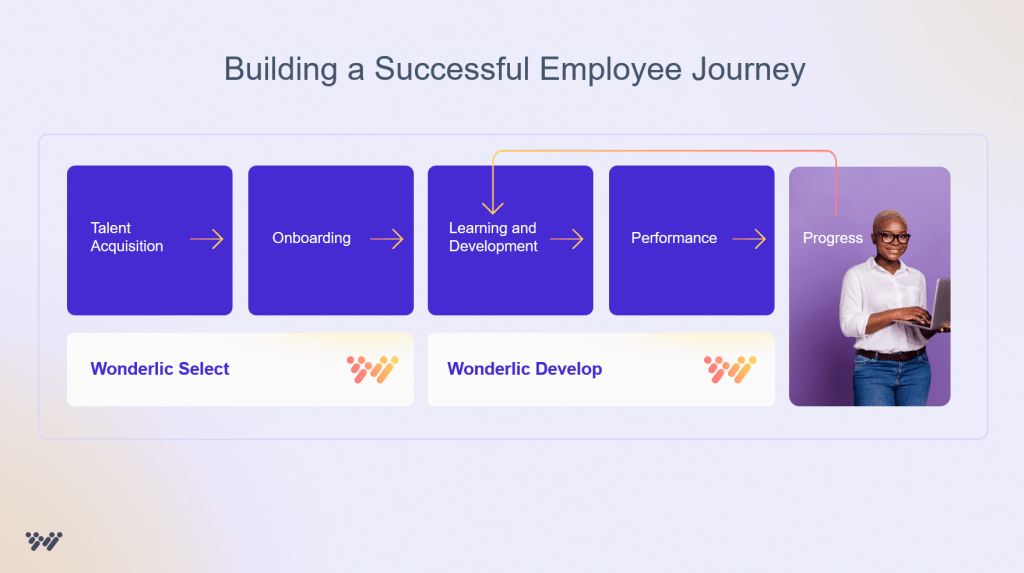
Having an assessment that helps inform all your talent decisions — without having to build assessments yourself or guess at which factors are most important — is like having an HR superpower. Assessment providers who offer adaptable and flexible tools that incorporate the latest technology are the best fit to meet the evolving needs of your organization.
Ensure Results are Easy to Interpret
Pre-employment assessments are powerful tools — but the actual decision-making lies with recruiters and hiring managers. That’s why it’s so important for recruiters and hiring managers to understand what results mean about a candidate’s or an employee’s abilities, potential, and fit within the organization.
If results are too complex or difficult to understand, recruiters may misinterpret the results, or recruiters may need expensive training and licensing before they appropriately understand the results. At Wonderlic, we’re all about making assessment outcomes easy to understand. For
example, our Wonderlic Select pre-hire assessment tool uses a single, straightforward score called the Overall Fit Score for each job candidate. This combined score makes it easier to compare candidates. Recruiters and hiring managers can even drill down into specific scores to see how candidates fared in any component of the multi-measure test and why candidates scored the way they did. These insights give decision-makers the confidence to choose the right candidate for their teams.
How Is a Pre-Employment Assessment Created?
You may be wondering what goes into creating a pre-hire assessment. While there are many steps involved, the two most important elements are reliability and validity. In other words, unless your pre-employment assessment is trustworthy and accurate, it won’t help you make informed hiring decisions. Here’s a simplified list of the steps involved:
- First, decide what to measure.
- Ensure the connection from the measure to the desired outcome.
- Design items to assess what you want to measure.
- Ensure those items are fair, reliable, and valid.
- Decide how to score it.
- Decide how to make comparisons.
- Perform benchmarking tests across a full range of candidates and employees.
- Pilot your pre-hire assessment with enough of a sample size to confirm functionality.
- Update your pre-employment assessment with the latest scientific advances and industrial-organization psychology.
While this may seem like a short list, each of these components has decades of research and best practices behind them. Creating a trusted and accurate pre-hire assessment is an incredibly important and difficult ask. That’s why it’s important to choose a pre-employment assessment with decades of experience and proven results.
Examples of Pre-Employment Assessment Questions
Cognitive Question
Motivation Question
Personality Question
How Wonderlic Helps With Pre-Hire Assessments
Given how complex people and work are today, it’s no surprise that companies like yours want to understand job candidates beyond merely assessing their personality, cognitive skills, or motivation alone. It’s about seeing the whole picture — uncovering multiple dimensions of an individual to make the right decision the first time every time.
That’s why we advocate for multi-measure assessments as the go-to solution for recruiters and HR leaders. These evaluations explore various aspects of a person, offering a deeper understanding of their potential, strengths, and how they fit into specific roles.
Wonderlic Select
Wonderlic Select is our multi-measure pre-hire assessment that gives you and your team comprehensive insights tailored to the unique role you’re hiring for — so you can make smarter hiring decisions.
Wonderlic is the only provider in the market that offers off-the-shelf job-scoring profiles that cover all existing and emerging jobs. Armed with these insights, you and your team get the most accurate information for the role you’re hiring for without spending weeks or months building customized job profiles or guessing which features are most important.
Wonderlic Develop
With Wonderlic Develop, our employee assessment and employee development tool, employees can quickly and easily gain job-specific insights into their strengths and weaknesses, discovering tips and tools they can easily incorporate into their day-to-day work to improve their performance and advance their careers. Develop also requires little to no manager oversight, giving employees the agency and ability to improve at their own pace without overburdening managers or relying on their ability to effectively develop talent.
Are you ready to effectively evaluate candidates and ensure the perfect match between talent and roles? Get started with a Wonderlic demo.
Want to learn more about Wonderlic Select? Check out our FAQ.



